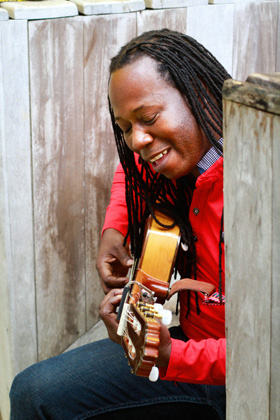The bass lines hit you first, rolling like waves. Then the vocals, calling over the horizon in the kind of piercing tone that can beckon a fisherman back to the shore. The music of the Garifuna people—descendants of 17th-century shipwrecked slaves and indigenous Caribbeans living along the coasts of Honduras and Belize—seems forever tied to the sea.
The style is known as paranda, an acoustic-based, guitar-heavy tradition rooted in percussive rhythms. A while back it was nearly lost, poised to be the next Buena Vista Social Club as people sought out the very last of the old players. Yet with his new album, Landini, singer/songwriter Aurelio Martinez, who goes by Aurelio, keeps the Garifuna tradition alive.
“I used to be worried about the future of paranda music,” Aurelio says, “but not anymore. It makes me happy to see young Garifuna artists playing the style again and composing new songs.” It’s an optimistic notion, since Aurelio is still the main ambassador for paranda music—especially since his friend and collaborator, Belizean musician Andy Palacio, passed away in 2008. Yet it’s surely this grave reality that motivates Aurelio to write music that speaks to his community and introduces Garifuna music to the world at large.
Once a Honduran congressman, Aurelio traveled back to his roots to make the album, drawing inspiration from the small village of Plaplaya, where he grew up. With its voices raised in chorus and the drumbeats flowing like water, you can almost feel the heat of the Honduran sun.
For the Garifuna, people of a diaspora, music is one of the touchstones that bring them together. Percussionist and bandleader Ricardo Guity Blanco, a visiting artist in the University of Washington Ethnomusicology program, can attest to the need for it. About 1,500 Garifuna live in the Seattle area, he says, some of whom gather to hear his band, Hagucha Garinagu. He signs e-mails with the phrase Heretimatiwa Uwara: “We Are Stronger United.” “Music is our voice,” he says. “It absolutely brings us together.”
Aurelio agrees that music unites Garifuna near and far. “For us Garifuna, music is like food,” he says. “It is essential to our survival. Sometimes music is even more important for Garifunas living in the U.S., because music connects them to home, to their roots.”
music@seattleweekly.com
AURELIO MARTINEZ The Triple Door. 216 Union St., 838-4333, thetripledoor.net. $20 adv./$25 DOS. ll ages. 7:30 p.m. Tues., Dec. 30.





